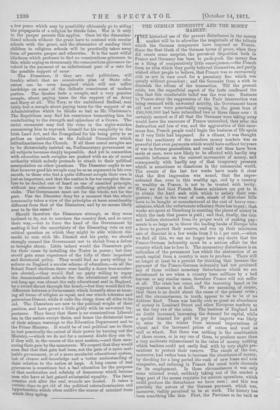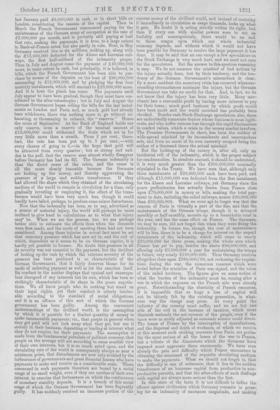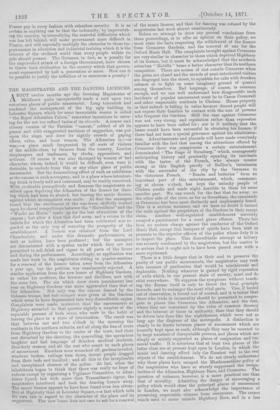THE GERMAN INDEMNITY AND THE MONEY MARKET.
THE historical use of the present disturbance in the money market will be to advertise the magnitude of the tribute which the German conquerors have imposed on France. Since the first blush of the German terms of peace, when they did create some surprise, the prevalent disposition both in France and Germany has been to pooh-pooh the money fine as a thing of comparatively little consequence,—the French from an idea which they partly believed themselves, and partly wished other people to believe, that France was so enormously rich as not to care much for a pecuniary fine which was utterly without precedent ; and the Germans from a wish to• diminish the odium of the transaction. Till the present crisis, too, the superficial aspect of the facts confirmed the idea that this comfortable belief was the true one. Business in France since the suppression of the Paris insurrection was being resumed with unwonted activity, the Government taxes old and new were punctually coming in, the great loan of £80,000,000 had been subscribed two or three times over : it certainly seemed as if all that the Germans were taking away would leave the resources of France untouched, that after the destruction and loss of war, and the aggravation of this enor- mous fine, French people could begin the business of life avain as if very little had happened. As a climax, it was thought that the machinery of the modern money markets was so powerful that even payments which would have sufficed foryears of war in former generations, and could not then have been made at once, were now likely to be effected with hardly any sensible influence on the current movements of money, and consequently with hardly any of that temporary pressure which is sometimes so disastrous in the commercial world. The events of the last few weeks have made it clear that the first impression was sound, that the unpre- cedented fine, even in this wealthy age, and by a country BO wealthy as France, is not to be treated with levity. When we find that French finance ministers are put to it, to obtain the hard Gash with which to satisfy their con- querors ; that in the want of cash, sheds of first-class bills have to be bought or manufactured at the cost of heavy com- missions, which the unfortunate tributary State has to pay ; that weeks are spent at Strasburg in counting the pieces of money in which the cash that passes is paid ; and that, finally, the coin and bullion abstracted from its proper work of making pay- ments is so large as to throw the leading banks of Europe into a fever to protect their reserve, and run up their minimum rate of discount in a few weeks from 2 to 5 per cent.,—when we find all this, we can no longer have any doubt that the Franco-German indemnity must be a serious affair for the country which has to lose it. The momentary disturbance is an indication of the permanent loss which the abstraction of so much capital from a country is sure to produce. There will no longer at least be a pretext for thinking that because the payment of the Franco-German indemnity had not produced any of those evident monetary disturbances which we are accustomed to see when a country loses millions by a bad harvest or any similar cause, therefore France will not suffer at all. The crisis has come, and the reasoning based on its supposed absence is at fault. We are assuming, of course, that there is no doubt about the cause of the present crisis ; and the circumstances, in truth, appear to us to be of no dubious kind. There was hardly ever so great an abundance of money in Lombard Street and other European markets as on the very eve of the crisis. The business of England bad no doubt increased, increasing the demand for capital, while• a special demand for gold to pay for imports was likely to arise in the winter from unusual importations of wheat and the increased prices of cotton and wool as well as wheat. But there was nothing in the combination of these causes, or in any one of them, to produce more than a very moderate enhancement in the value of money, nothing which bankers -could not easily deal with by very slight pre- cautions to protect their reserve. The result of the war, moreover, had rather been to increase the abundance of money, by checking for a long period the rush of new loans and new companies, and reducing in France the usual trade channels for its employment. In these circumstances it was only some external event, suddenly taking out of the market a large part of the means requisite for current operations, which could produce the disturbance we have seen ; and this was precisely the nature of the German payment, which was, moreover, visibly perceived to be at work. The history has been something like this. First, the Parisians so far back as
last January paid £8,000,000 in cash, or in short bills on London, constituting the ransom of the capital. Then in March the French Government commenced paying for the maintenance of the German army of occupation at the rate of £2,000,000 per month, and is probably still paying at half
that rate, making the payments, it is true, in a large extent in Bank-of-France notes, but also partly in coin. Next, n May Germany received five or six millions, making up, along with the £13,000,000 deducted for the Alsace and Lorraine rail- ways, the first half-milliard of the indemnity proper. Then in July and August came the payment of £40,000,000 more, to some extent in cash, but principally, it is believed, in bills, which the French Government has been able to pur- chase by means of the deposits on the loan of £80,000,000 amounting to £12,000,000, and by pledging the first four monthly instalments, which will amount to £20,000,000 more. And it is here the pinch has come. The payments until July appear to have been gradual, though they must have con- tributed to the after-catastrophe ; but in July and August the German Government began selling the bills for the last instal- ments on London and Paris, and, as much gold had already been withdrawn, there was nothing more to go without ex- hausting, or threatening to exhaust, the " reserves," Hence the crisis of September. As the Bank of England holds our only reserve, even a reserve of the unusual amount of £16,000,000 could withstand the drain which set in for very little more than a month. From 2 per cont., there- fore, the rate has been put up to 5 per cont,,—with every chance of going to 6,—in the hope that gold will be attracted from every quarter ; but so strong and sud- den is the pull, that the reserve may almost wholly disappear before Germany has had its fill. The German indemnity is thus the direct cause of the crisis, and the cause is all the more clearly traceable because the Germans are locking up the money, and thereby aggravating the pressure of a large and sudden transference. If they had allowed the share which they obtained of the circulating medium of the world to remain in circulation for a time, only gradually investing or employing it, the effect of the trans- ference would have been very much less, though it could hardly have failed, perhaps, to produce some minor disturbance. Now that the indemnity has been, so to say, advertised as a source of material injury, the world will perhaps be more inclined to give heed to calculations as to what that injury may be. When we see the process, too, we are perhaps better able to estimate the effects than when the demands were first made, and the mode of meeting them had not been considered. Among these injuries in actual fact must bo set that monetary pressure which has now set in, and the end of which, dependent as it seems to be on German caprice, it is hardly yet possible to foresee. No doubt this pressure in all its severity was not essential to the payment, but the incident of locking up the cash by which the extreme severity of the pressure has been produced is so characteristic of the German Government, that it fairly deserves blame for its mode of enforcing payment as well as for the exaction itself. Its conduct in the matter displays that cynical and unscrupu- lous disregard of any interests but its own, which has been BO strikingly characteristic of its share in the peace negotia- tions. We all know people who do nothing but stand on their legal rights, yet their conduct is utterly intoler- able according to the standard of social obligations, and it is an 'offence of this sort of which the German
government has been guilty. Among the convenient understandings of the civilized world, is the assumption by which it is possible for a limited quantity of money to make innumerable payments; viz., that people in general when they get paid will not lock away what they get, but use it strictly in their business, depositing or lending at interest what they do not require for their payments. The assumption is made from the fundamental postulate of political economy, that people on the average will act according to some sensible view of their own interests, but it is so much acted upon, and the circulating coin of the world is consequently always so near a minimum point, that disturbances are now only avoided by the forbearance of governments and great financial houses who have payments to make and receive on a considerable scale, Those concerned in such payments therefore are bound by a social usage of no small weight, even if they are careless of their own interest, to exercise that forbearance on which the continuance of monetary stability depends. It is a breach of this social usage of which the German Government has been flagrantly guilty. It has suddenly received an immense portion of the
current money of the civilized world, and instead of restoring it immediately to circulation as usage demands, locks up what it gets. No doubt it is acting strictly within its right, but then if every one with similar powers were to act as foolishly and unscrupulously, there would be an end to those usages upon which our whole industrial economy depends, and without which it would not have been possible for Germany to receive the large payment it has done. It may be said that no one except a few speculators on the Stock Exchange is very much hurt, and we need not care for the speculators. But the answer to this specious reasoning is easy. We do not measure the mischief of bad actions by the injury actually done, but by their tendency, and the ten- dency of the German Government's misconduct is clear. By a mere accident the monetary crisis has occurred when sur- rounding circumstances minimize the injury, but the German Government can take no credit for that. And, in fact, we do not know that the injury has been very little. Many mer- chants lose a reasonable profit by having more interest to pay for their loans ; much good business by which profit would have been made and the world enriched has probably been checked. Besides rash Stock-Exchange speculators, also, there are undoubtedly numerous dealers whose business is most legiti- mate, and who suffer ruinous loss through the rapid fluctuations in market values, which a crisis in the money market involves. The Prussian Government, in short, has been the author of wide-spread mischief by its inconsiderate and unscrupulous acts, and from no merit of its own narrowly escaped being the author of a thousand times the actual mischief.
But the locking-up of the money is, after all, only an incidental evil of the indemnity, which is the proper subject for condemnation. In absolute amount, it should be understood, it is very much greater than the £200,000,000 nominally stipulated in the Treaty. We have seen that, although only three instalments of £20,000,000 each have been paid, and although £13,000,000 was deducted from the first instalment for the Alsace and Lorraine railways, yet Germany since the peace preliminaries has actually drawn from France close upon £70,000,000 in money or bills, making the total pay- ment to date, including the ceded railways, nearer £80,000,000 than £60,000,000. What we were apt to forget was that the ransom of Paris is virtually a part of the fine, and that the maintenance of the German troops, though it is defrayed monthly or half .monthly, mounts up to a formidable total in the year, and has the same effect on France. The Germans, we may be sure, did not forget this when they were fixing the indemnity. In future, too, though the cost of maintenance will be less, there is to be a charge for interest on the unpaid instalments of the indemnity, which will come to nearly £20,000,000 for three years, making the whole sum which France has yet to pay, besides the above £80,000,000, and allowing only £6,000,000 a year for maintaining the troops in future, very nearly £180,000,000. Thus Germany receives altogether close upon £260,000,C00, not reckoning the requisi- tions during the war, the numerous ransoms which were levied before the armistice of Paris was signed, and the value of the ceded territory. The figures give us some notion of what the burden of the indemnity must be, coming after a war in which the expenses on the French side were already great. Notwithstanding the elasticity of French resources, it is impossible that so huge a loss of capital will not be bitterly felt by the existing generation, in what- ever way the charge may press. At every point the industry of the country must suffer, and we see but one side of the evil in the increase of taxation, which must diminish seriously the net revenue of the people, even if the taxes were as nicely adjusted as economic science could direct. The losses of France by the interruption of manufactures, and the dispersal and death of workmen, of which we receive at this moment such striking accounts from Paris, are proba- bly the most serious of all the losses of the war to France, but a tribute of the dimensions which the Germans have imposed must aggravate them enormously. We have seen already the pain and difficulty which France encounters in obtaining the command of the requisite circulating medium to make the payments. What we should not forget is, that the difficulty is one of substance, that it lies in the sudden transference of an immense capital from productive to non- productive pursuits, and that the after-effects of such dealings with capital are always more serious than the first. In this state of the facts it is not difficult to define the offence against civilization which Germany commits in press- ing for an indemnity of enormous magnitude, and making
France pay in every fashion with relentless severity. It is as certain as anything can be that the indemnity,' by impoverish- ing the country, by intensifying the material difficulties which war has left behind, will make government more difficult in France, and will especially multiply the obstacles to those im- provements in education and industrial training which it is the interest of the civilized world that every people within its pale should possess. The Germans, in fact, as a penalty for the unprovoked attack of a foreign Government, have chosen to throw back civilization in the country which that govern- ment represented by half a generation or more. Row can it he possible to justify the infliction of so enormous a penalty ?




































 Previous page
Previous page